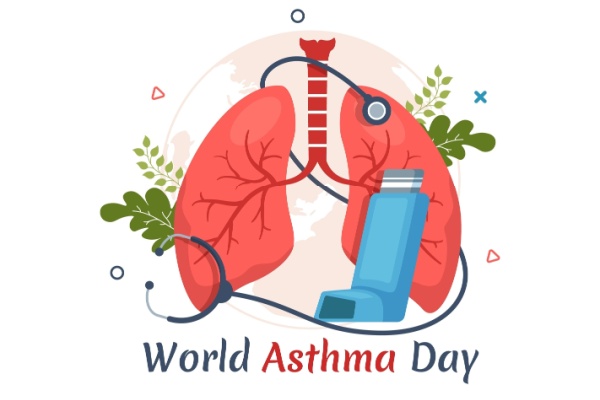 On this World Asthma Day, Let’s “Make Inhaled Treatments Accessible for ALL”
On this World Asthma Day, Let’s “Make Inhaled Treatments Accessible for ALL”
Every year on the first Tuesday of May, people around the world recognize World Asthma Day – a time to raise awareness, share resources, and advocate for better care for those living with asthma. This year, World Asthma Day falls on May 6, 2025.
The Global Initiative for Asthma (GINA) has chosen this year’s theme as “Make Inhaled Treatments Accessible for ALL.” The goal is simple but powerful – ensure that every person with asthma, regardless of income, race, age, or location, has access to the inhaled medications they need to manage their condition. Inhaled treatments are the cornerstone of asthma care. Without them, many people with asthma would not be able to control their symptoms, and lives would be put at risk.
Why access to inhaled treatments matters
According to the Allergy & Asthma Network, asthma is a chronic respiratory disease that affects more than 25 million people in the United States. Medications like quick-relief inhalers and daily controller inhalers help prevent and treat asthma symptoms. But too many people face barriers to accessing these essential treatments.
Barriers may include:
- High medication costs
- Lack of insurance coverage
- Limited access to specialists
- Language and health literacy challenges
When people don’t have access to their inhalers, asthma becomes harder to manage. They are at higher risk of asthma attacks. Emergency room visits, hospitalizations, and even asthma-related deaths can increase.
Asthma Education + Access = Empowered Care
Education plays a key role in identifying asthma triggers and addressing barriers to care. When people understand how to manage asthma, they use their medications correctly and advocate for their health needs. At the same time, healthcare systems must work to remove structural and financial barriers to ensure inhaled treatments are accessible for all.
Supporting Access and Education
The Allergy & Asthma Network (AAN) is committed to breaking down barriers with programs and events that combine education, health equity, and community outreach:
1. Trusted Messengers Program
Trusted Messengers is AAN’s award-winning, multifaceted health equity initiative. The program is built on a belief in community-led solutions to achieve equity in healthcare. It helps people get the knowledge they need about asthma care from trusted, credible sources. It encourages patients to adopt healthy behaviors and make informed healthcare decisions.
Trusted Messengers has three parts:
- Outreach events in under-resourced communities
- Partnerships with local groups
- Free virtual asthma coaching to improve asthma self-management skills
This health equity initiative:
- Enables asthma educators, respiratory therapists and coaches to meet people at health fairs and local events
- Provides easy-to-read, culturally responsive information in English and Spanish. Educational resources cover asthma, allergies, eczema, and other health issues
- Promotes trust in health professionals, self-management, self-advocacy, and shared decision-making
- Creates opportunities for patients to learn about asthma research. They can also learn about taking part in clinical trials.
2. Virtual Asthma Coaching Program
The free Virtual Asthma Coaching Program is an award-winning initiative to help asthma patients. It’s part of the Trusted Messengers program. When people with asthma meet with certified asthma educators at Trusted Messengers events, they are invited to enroll in virtual asthma coaching. This is a free 6-week series of 1-on-1 online sessions – available in English and Spanish – with a certified asthma educator or respiratory therapist. They meet via a laptop computer, smartphone or tablet.
The focus of the sessions is on helping patients develop asthma self-management skills and learn how to keep their asthma under control. They learn what questions to ask their doctor and how to overcome barriers to their care. Research shows that adults with uncontrolled asthma who take part in virtual asthma coaching have better asthma control and quality of life. They also have fewer doctor or emergency visits.
3. USAsthma Summit
This annual event, now in its 11th year, takes place during the American College of Allergy, Asthma & Immunology (ACAAI) annual meeting. The all-day conference brings together healthcare leaders and experts to address the state of asthma and asthma care in the United States.
Presenters and attendees share lessons learned and best practices from national, state and community asthma programs. They advance Guidelines-based asthma care, address health equity and access to care, consider new treatments, and discuss ways to advocate for patients.
4. Webinars
Since 2018, Allergy & Asthma Network has offered free, hour-long educational webinars. These are powerful platforms for asthma education. The webinars offer guidelines-based asthma education. They are for healthcare professionals, patients, and caregivers alike.
5. Online Resources
Allergy & Asthma Network’s online resources benefit patients, caregivers, and healthcare providers. Resources are available for education on allergies, asthma, and related conditions. Our educational resources are designed to empower people to manage their asthma more effectively and improve outcomes. They offer online resources through their website and online store. Many are available as free digital downloads.
6. Podcasts
AAN started the Allergy, Asthma & Immunology Innovations podcast series to help raise awareness of asthma worldwide. The podcast is now in its second year. To produce the podcasts, they partnered with board-certified allergist Payel Gupta, MD and asthma patient Kortney Kwong Hing, co-hosts of The Itch Podcast. In the 20-25 minute podcasts, Dr. Gupta and Kortney discuss topics such as asthma control, oral corticosteroids, biologics, and more.
Let’s make inhaled treatments accessible for all
This World Asthma Day, stand with GINA to advocate for better access to lifesaving inhaled medications. Access to treatment should not depend on who you are or where you live.
—
Photo Credit: denayunebgt / Shutterstock.com


